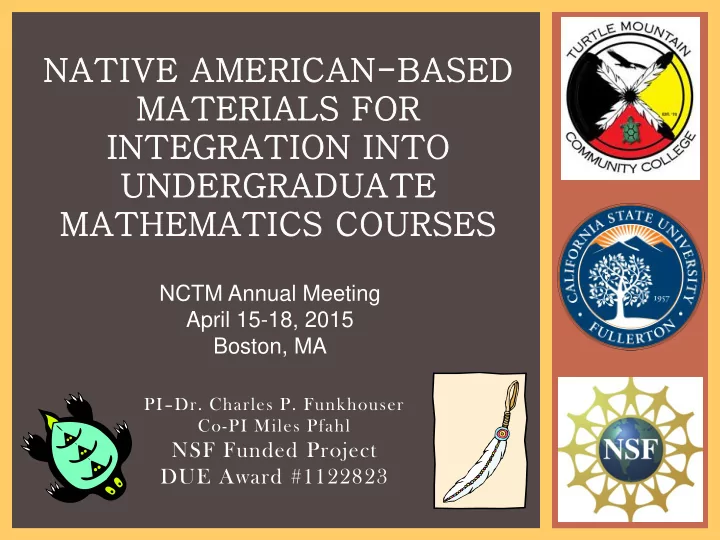

NATIVE AMERICAN-BASED MATERIALS FOR INTEGRATION INTO UNDERGRADUATE MATHEMATICS COURSES NCTM Annual Meeting April 15-18, 2015 Boston, MA PI – Dr. Charles P. Funkhouser Co-PI Miles Pfahl NSF Funded Project DUE Award #1122823
PRESENTATION OUTLINE Welcome and Introductions Project Purpose and Summary Project Description and Objectives Integration into Courses Lesson Piloting Protocol Facebook Page and Website The Lessons
INTRODUCTIONS Miles Pfahl Dr. Charles Funkhouser o Mathematics Professor o Mathematics Instructor 20 years at the University of 14 years at Turtle Mountain Wyoming and Cal State Universities Comm. Coll. located on the Turtle Mountain Chippewa Res. o Math and Computer Sci. Teacher Belcourt, ND 17 years at Frenchtown High School, Frenchtown, Montana o Mathematics Teacher 12 years at Turtle Mountain o NSF Project PI Comm. High School 2003 – 2007 TUES Type I 2011 – present TUES Type 2 o Project Director, PI, Co-PI Numerous grants and programs (7-12 and higher ed)
MORE INTRODUCTIONS Harriet Edwards – CoPI at California State University – Fullerton Patrick Weasel Head – Project Tribal Cultural Liaison University of Montana (Retired) Luther Olson – Project Materials Developer Mathematics Instructor, Turtle Mountain Community College Roberto Wheaton – Project Materials Developer High School History/Science Instructor – Desert Hot Springs, CA Michael Little Crow – Project Materials Developer Mathematics Instructor, Scottsdale Community College Cecelia Myerion and Frances Allard Abbott – Cultural Advisors Turtle Mountain Community College
PURPOSE Infrequently mentioned in most mathematics instructional settings in the US is a parallel, rich system of mathematics developed and used by indigenous people of North America. These materials allow instructors of undergraduate courses to infuse culturally relevant and interesting mathematics activities into their courses. These materials will not only allow Native American students to be more fully involved in their learning, but also give all students a fuller appreciation of the universal nature and power of mathematics.
NATIVE AMERICAN BASED MATERIALS FOR INTEGRATION INTO UNDERGRADUATE MATHEMATICS COURSES PROJECT SUMMARY Researches and develops undergraduate math materials based in the culture of Native American peoples. Materials are classroom ready. Various mathematical concepts that coincide with traditional math content in undergraduate courses. Give additional perspective as to how traditional math topics can be incorporated into real world situations in the Native American culture.
PROJECT DESCRIPTION CSUF and TMCC develop materials based in intellectual and cultural traditions of Native American peoples to be used in undergraduate math courses. Integrate these materials into mainstream university and Tribal Community college mathematics courses. Foster faculty expertise in the materials’ mathematics, methods and cultural bases. Assesses the materials’ effects on student and instructor attitudes. Make the materials available for dissemination to universities and Tribal Community colleges.
PROJECT OBJECTIVES 17 classroom ready lessons are being / have been developed including a powerpoint presentation and instructor guide for each lesson. Materials are being/have been piloted at CSUF, TMCC and other universities and community and Tribal colleges. Other technological enhancements have been developed such as a project website and Facebook page. Faculty training in deliverance of materials has taken place. Native American and other students will have integrated exposure to the traditional mathematics and methods of Native Peoples within courses taught in their undergraduate curriculum.
CONTINUED… University and Tribal college faculty will have an opportunity to integrate traditional mathematics and methods of Native Peoples into the undergraduate courses they teach. The following topics from Native American mathematics will be integrated and implemented into undergraduate course: number theory, numeration systems, topology, measurement, probability and chance, statistics and data mining and geometry. The appropriateness and efficacy of the materials used in undergraduate courses will be assessed and evaluated. Changes in student and instructor attitudes towards Native American traditional mathematics and intellectual traditions will be assessed. Results will be widely disseminated.
INTEGRATION INTO COLLEGE LEVEL MATHEMATICS COURSES Following is a list of Potential Undergraduate mathematics courses where the developed lessons may be integrated: MATH 100 Applied Mathematics MATH 102 Intermediate Algebra MATH 111 College Algebra I MATH 112 College Algebra II MATH 103 University Algebra MATH 212 Statistics I MATH 213 Statistics II MATH 335 Mathematical Probability MATH 303 Fundamental Concepts in Elementary Mathematics MATH 380 History of Mathematics MATH 417 Foundations of Geometry MATH 402 Logic and Geometry for the Secondary Teacher.
LESSON PILOTING PROTOCOL Pre Attitude survey will be administered to the students participating in the project by faculty. Pre Attitude survey will be completed by the faculty member participating in the project. Post Attitude survey will be administered to both students and faculty participating in the project. A Post Student Focus Group session will be conducted after the lessons have been piloted. Documents: 1. Survey Administration Instructions 2. Student Survey 3. Instructor Survey 4. Protocol for Student Focus Group
FACEBOOK PAGE www.facebook.com/NativeAmericanMathematicsMaterials
THE PROJECT WEBSITE http://math.fullerton.edu/cfunkhouser/
THE 17 LESSONS Transformational Geometry - Native Design Probability - Plumstone Game Numeration - Gesture Counting Geometry - Medicine Wheel Geometry – Tepee Surface Area and Volume Probability – Stick Game Numeration – Beading Geometry – Arrowheads Geometry – Beadwork Measurement – Hand Games Linear Programming – Native Clothing Geometry – Wigwam Surface Area Geometry – Tessellations Star Quilts Statistics – Diabetes Rates Geometry – Tepee Oblique Surface Area and Volume Algebra – Blood Quantum Numeration – Chippewa Grammar of Numbers
TAKE A LOOK AT A LESSON OR TWO Miles Pfahl Assistant Professor – Mathematics Phone: 701-477-7994 Email: mrpfahl@tm.edu
Recommend
More recommend